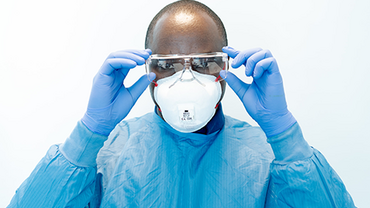Online micro learning: What are the non-pharmaceutical countermeasures to minimise transmission of COVID-19?Archived
ECDC is offering micro learnings related to COVID-19 through the ECDC Virtual Academy (EVA). EVA provides access to training in the domain of Disease Prevention & Control, in order to strengthen capacity of European Union and its Member States.
This micro learning is designed to take 40 minutes and you will learn about:
- Personal protective measures: hand hygiene and cough etiquette;
- Personal protective equipment (PPE): respirators, facemasks, goggles, downs and gloves;
- Donning (wear) and doffing (remove) PPE.
- Estimate the necessary amount of PPE.
Non-pharmaceutical countermeasures
The primary objective of non-pharmaceutical countermeasures is to reduce the impact of an outbreak by reducing the number of contacts that result in disease transmission. This may be achieved through four main countermeasures:
- Personal Protective Equipment
- Environmental Countermeasures
- Physical Distancing Countermeasures
- Travel Related Countermeasures
The micro learning activities provided on the ECDC Virtual Academy are based on two ECDC reports "Guidelines for the use of non-pharmaceutical measures to delay and mitigate the impact of 2019-nCoV" and "Personal protective equipment (PPE) needs in healthcare settings for the care of patients with suspected or confirmed novel coronavirus (2019-nCoV)".
Moreover, these materials are build upon the current knowledge on the SARS-CoV-2 and evidence available on other viral respiratory pathogens, mainly the Severe Acute Respiratory Syndrome coronavirus (SARS-CoV), the Middle East Respiratory Syndrome-related coronavirus (MERS-CoV) and seasonal or pandemic influenza viruses.
Since there are uncertainties concerning the infectious period of the SARS-CoV-2 and its basic reproductive number (R0), these materials should be interpreted with caution.
Guidelines for the implementation of non-pharmaceutical interventions against COVID-19
These ECDC guidelines detail available options for NPI in various epidemiologic scenarios, assess the evidence for their effectiveness and address implementation issues, including potential barriers and facilitators.
Personal protective equipment (PPE) needs in healthcare settings for the care of patients with suspected or confirmed novel coronavirus (2019-nCoV)
The aim of this document is to support public health preparedness planning with regard to personal protective equipment (PPE) needs in healthcare settings where patients suspected or confirmed to have been infected with the novel coronavirus 2019-nCoV are being treated.







